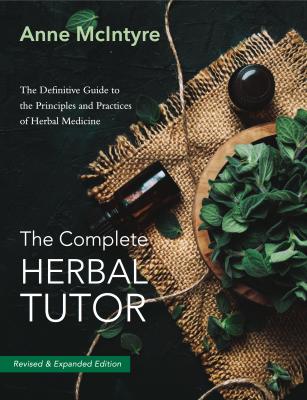The Complete Herbal Tutor. Anne Mcintyre
Читать онлайн.| Название | The Complete Herbal Tutor |
|---|---|
| Автор произведения | Anne Mcintyre |
| Жанр | Общая психология |
| Серия | |
| Издательство | Общая психология |
| Год выпуска | 0 |
| isbn | 9781911597469 |
The Complete
Herbal
Tutor
The Definitive Guide to the Principles and Practices of Herbal Medicine
Revised and Expanded Edition
Anne McIntyre
FNIMH, MCPP, MAPA
Published 2019 by
Aeon Books
12 New College Parade
Finchley Road
London
NW3 5EP
Copyright © 2019 by Anne McIntyre
The right of Anne McIntyre to be identified as the author of this work has been asserted in accordance with §§ 77 and 78 of the Copyright Design and Patents Act 1988.
All rights reserved. No part of this publication may be reproduced, stored in a retrieval system, or transmitted, in any form or by any means, electronic, mechanical, photocopying, recording, or otherwise, without the prior written permission of the publisher.
British Library Cataloguing in Publication Data
A C.I.P. for this book is available from the British Library
ISBN 978-1-91159-745-2
Printed in Great Britain
Contents
Growing, Harvesting and Storing Herbs
Introduction
Herbs are the most extraordinary plants. Their incredible ability to heal on all levels of our being never ceases to amaze and inspire me. Through my years in practice as a herbalist I have been asked many times how I came to be in this profession. The story actually begins in my childhood.
Herbal Roots
I have loved herbs ever since I was a child. I was intrigued by their delicious scents, all so unique, and their beautiful shapes and forms. Brought up in the country, I loved being surrounded by natural beauty, to the point that I have never been able to live in a town or city. My mother gave me a piece of her garden when I was little so I could grow my own herbs and flowers. This was my favourite occupation.
Studies in Herbalism
In my early twenties, while living in a cottage on a small island off the east coast of England, growing my own food and harvesting as much from the wild as I could, I began to learn about the wild herbs that were growing around me. I realised that the earth provides all the raw ingredients for our health and well being and that herbs have the ability to keep us balanced in body, mind, emotions and spirit, if we can only understand the potential of their gifts to us to its fullest extent. After travelling in many parts of the world, looking for meaning in existence that would guide me to finding the right direction in my life, I resolved to find a place to study herbal medicine. After four years of study I became a member of the National Institute of Medical Herbalists, a professional body of herbalists that has existed since 1864.
At work in my herb garden.
Once in practice I continued to study, constantly searching for more pointers towards understanding the human organism and the keys to health and harmony, so that I could better serve my patients as well as my family and myself. Over the next few years I studied homoeopathy, aromatherapy, therapeutic massage and counselling. Finally I found Ayurveda, the system that resonated with me more that any other to date. Ayurveda is a body of knowledge and wisdom from India that incorporates a complex system of medicine, as well as guidelines for a way of living that aims, not only for freedom from suffering in mind and body, but for enlightenment itself. Today, I continue to study both herbal medicine and Ayurveda, and to incorporate the wisdom of all I learn into my practice and my writing.
A Holistic Approach
The writing of The Complete Herbal Tutor is motivated by the growing interest in using herbal medicine, in a practical and informed way, amongst healthcare practitioners and lay people alike. There is a great need for contemporary information encompassing a holistic view that acknowledges the intimate connection of mind and body, and promoting health and health education, rather than solely addressing illnesses and how to treat symptoms arising from them. This book provides a practical, easy reference guide to the 150 most commonly used herbs in the modern practice of Western herbal medicine and their uses, and, by this measure, it highlights the great contribution herbs can make to modern medical care.
Throughout, I have endeavoured to emphasise how herbs are used most effectively when they are prescribed after the taking of a full case history, with the intention of aiding innate homeostatic mechanisms, while addressing the underlying problems that give rise to health problems including diet and lifestyle.
Treatment Advice
While describing the herbal treatment of over 100 common ailments, The Complete Herbal Tutor is not intended to replace medical care which may require the greater knowledge and expertise of the professional medical herbalist or mainstream healthcare practitioner. The format of the Ailments section in the book follows a system approach, including the main systems affected by common illness, and the health problems covered in the text are those that I have commonly encountered in my practice of nearly forty years as a professional herbalist, and that I consider to be most applicable to treatment using herbs.
My dispensary.
Our Herbal Heritage
A conventional medical view might take some exception to aspects of Western herbal philosophy and approach to treatment which may follow some rather unorthodox lines. There may not be much scientific justification for the use of “alterative” or cleansing herbs to clear the body of toxins, or cooling herbs to clear “accumulated heat”. The use of these, however, is integral to the philosophies of ancient and respected systems of medicine, such as the Chinese, Tibetan and Ayurvedic, that have
